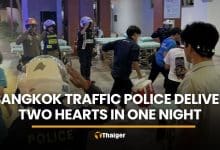Bangkok’s air pollution costs 400 billion baht annually

Bangkok is grappling with significant economic repercussions due to persistent air pollution, particularly from fine particulate matter known as PM2.5, leading to annual losses exceeding 400 billion baht.
The revelation emerged during a seminar organised by the National Health Commission Office in conjunction with the 17th National Health Assembly, where the financial toll of pollution was a focal point of discussion.
At this gathering, stakeholders from the private sector, academia, and local communities engaged in discussions about innovative strategies for managing air quality.
One prominent voice at the seminar was Witsanu Attavanich, an associate professor from the Faculty of Economics at Kasetsart University, who emphasised the importance of transitioning towards a creative economy. He advocated for the adoption of the Bio-Circular-Green Economy (BCG) model to drive sustainable development.
The BCG model is a comprehensive approach that integrates bioeconomy, circular economy, and green economy principles. Bioeconomy focuses on increasing the value of biological resources, circular economy aims at maximising resource efficiency and longevity, while green economy seeks to ensure sustainable economic growth without depleting environmental resources.
Witsanu underscored the dual nature of the air pollution crisis, highlighting its environmental and economic ramifications. He referenced a World Bank estimate, which places the global financial burden of health issues related to air pollution a 273.5 trillion baht (US$8.1 trillion) annually, equating to 6.1% of the global GDP.
Pollution challenges
Research presented at the seminar revealed that Bangkok experiences elevated PM2.5 levels for about six to seven months each year, far longer than typically assumed. This prolonged exposure results in substantial economic damage, with Bangkok suffering losses of 400 billion baht (US$11.7 billion) annually.
Witsanu noted that other regions, including Chon Buri, Nakhon Ratchasima, Chiang Mai, and Khon Kaen, are also significantly affected by similar pollution challenges.
Witsanu proposed leveraging the BCG model for economic development and clean air management, suggesting initiatives such as tree preservation and planting, inspired by the royal wisdom of His Majesty King Bhumibol Adulyadej The Great.
He further recommended encouraging carbon credits within the public sector and promoting a circular economy by repurposing waste materials to create income-generating opportunities.
Another critical measure he suggested involved making modern agricultural machinery accessible to farmers at affordable prices, thereby minimising farm burning and boosting crop yields, which would ultimately reduce household debt.
Panitarn Pavarolavidya, Deputy Secretary General of the Federation of Thai Industries, introduced an innovative solution in the form of a hybrid automatic city air purification tower known as Fah Sai, meaning clear sky.
Panitarn reckons that each Fah Sai tower could purify up to 60,000 cubic metres of air per hour, with the added capability of eliminating germs in both water and air, reported Bangkok Post.
“The machine costs 3 to 5 million baht (US$87,990 to 146,650), which is not expensive compared to the social costs that Bangkokians have to pay.”
Panitarn added that the towers are designed for easy installation and can be strategically placed to maximise their impact on urban air quality.
Latest Thailand News
Follow The Thaiger on Google News:


























